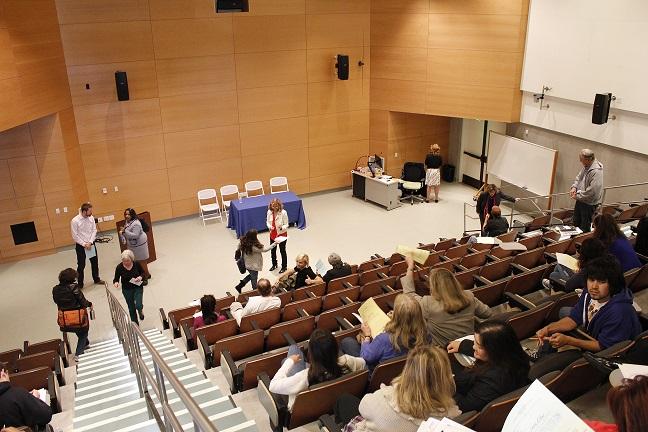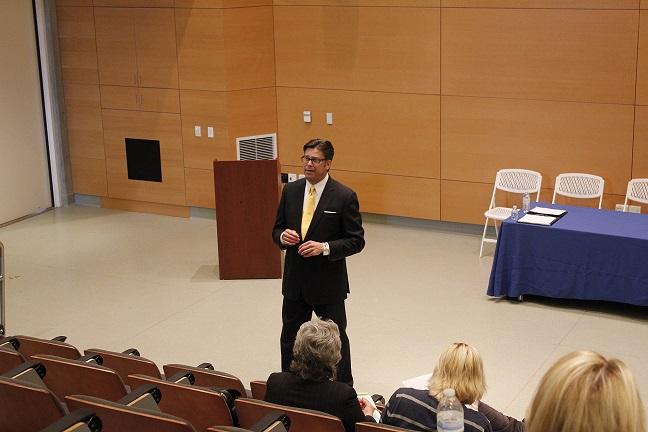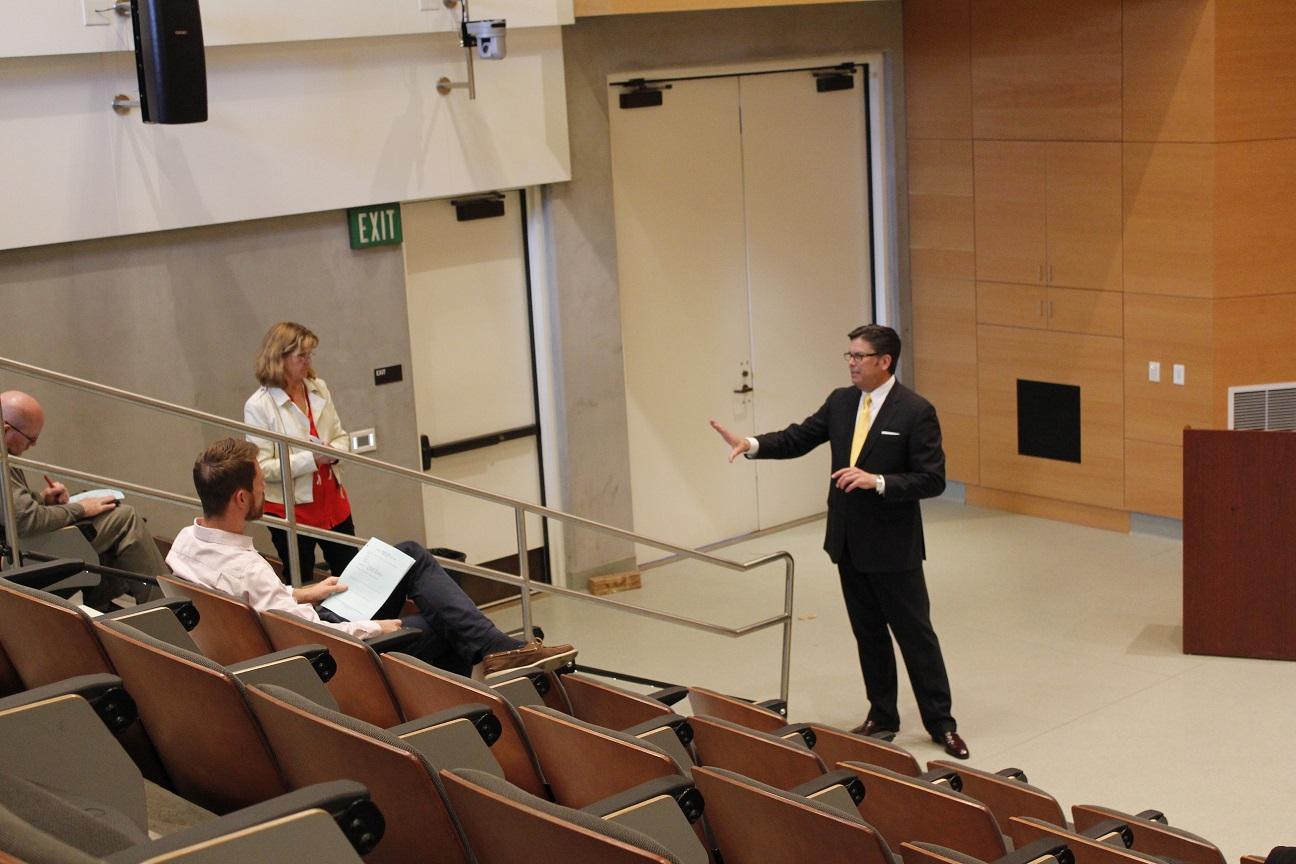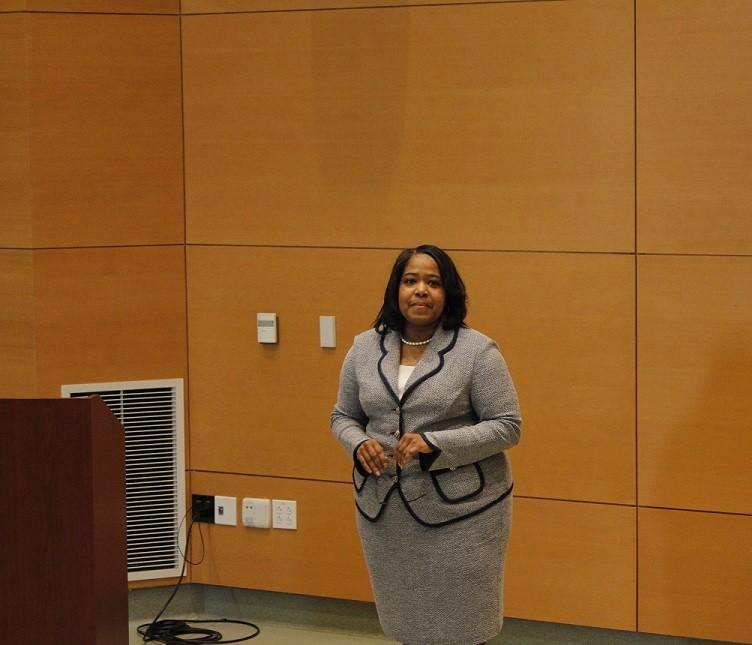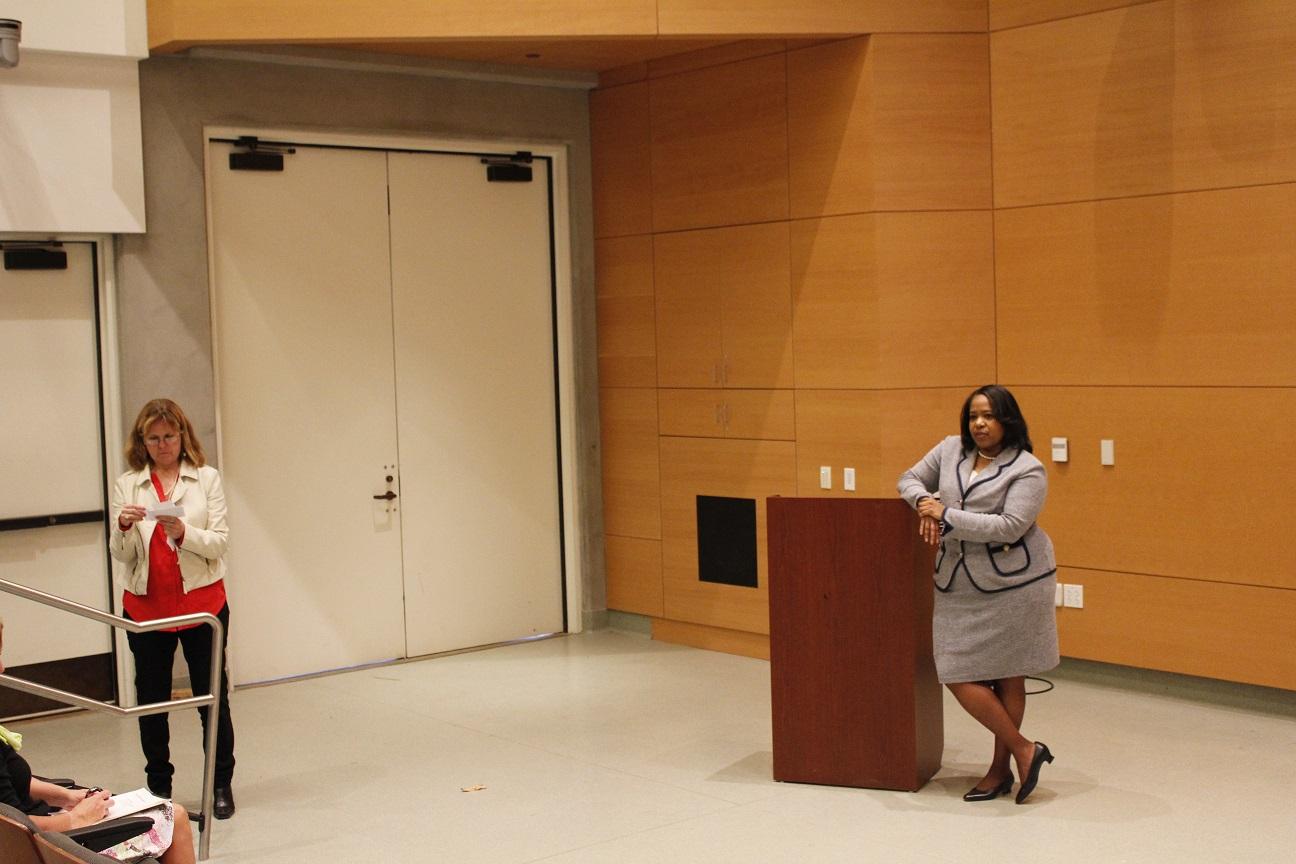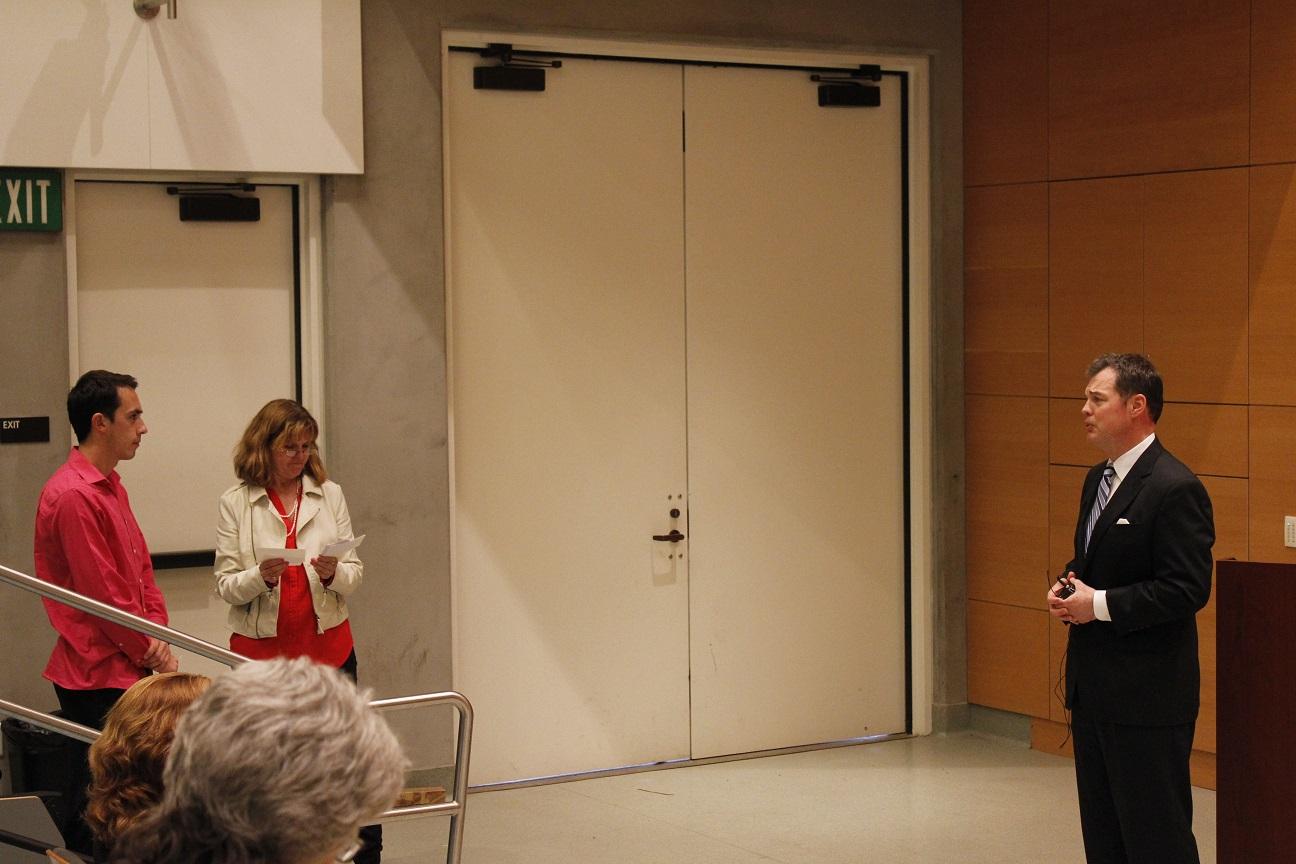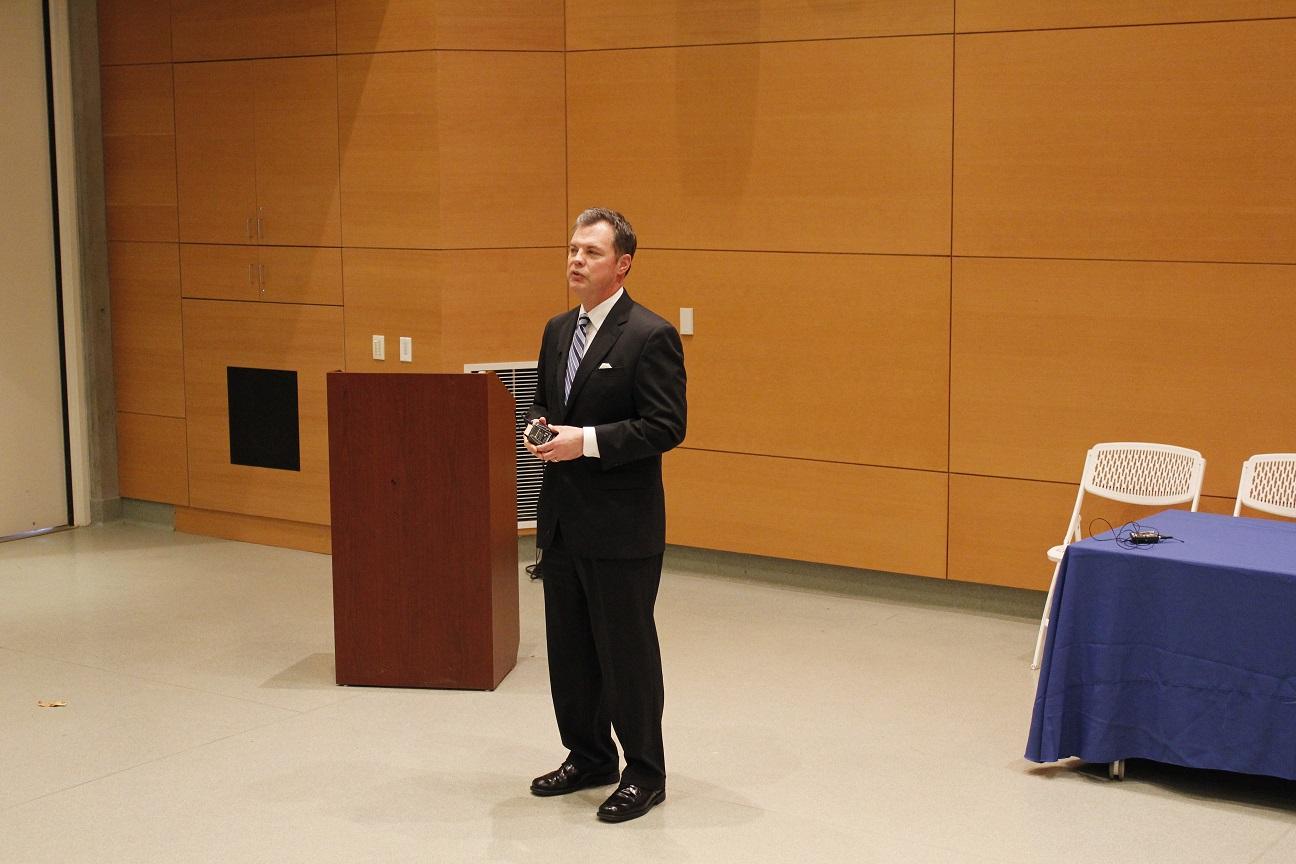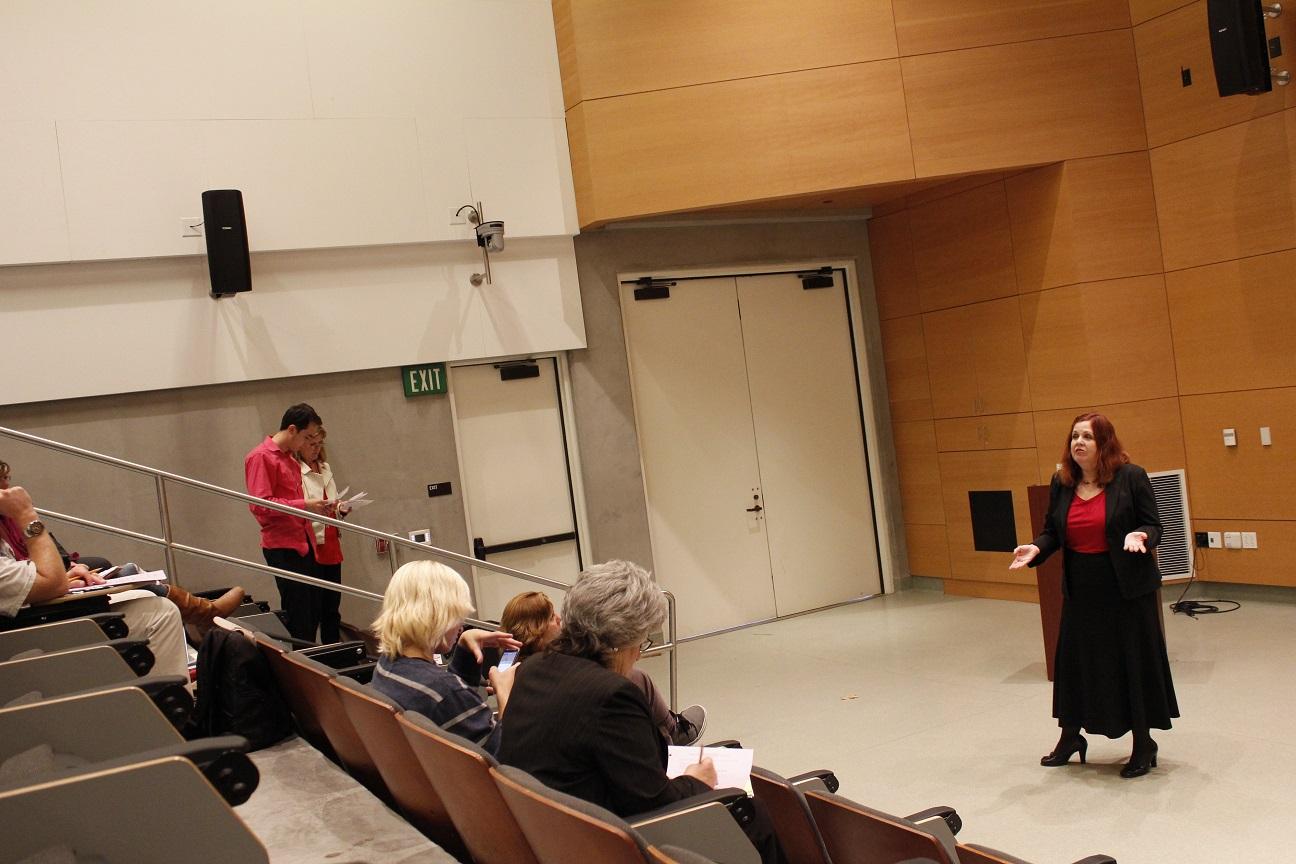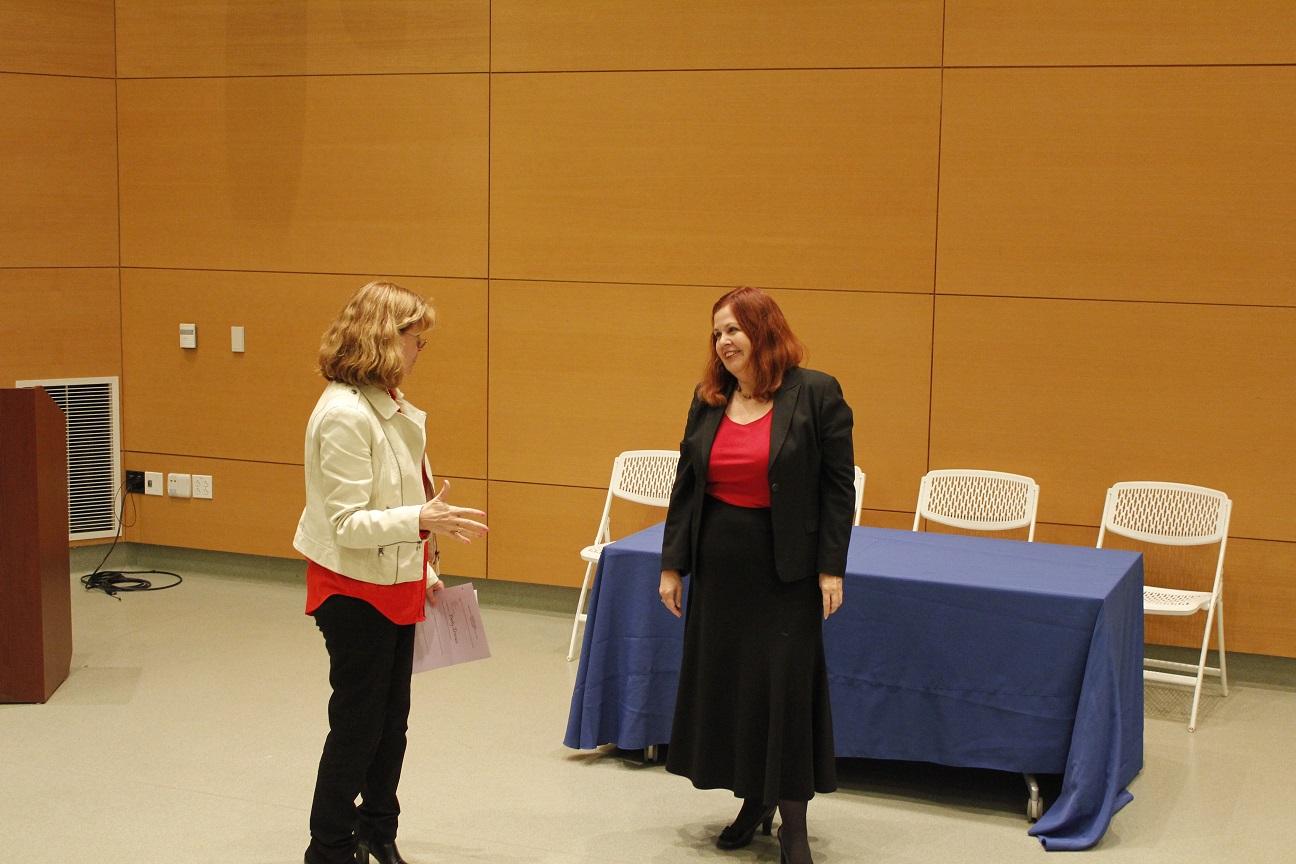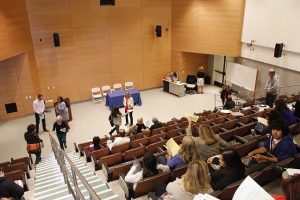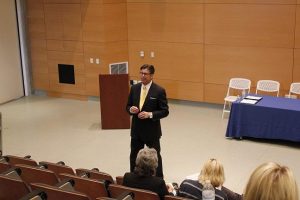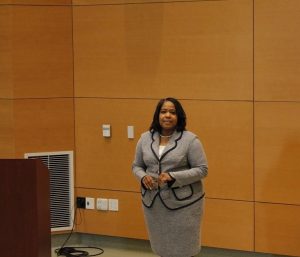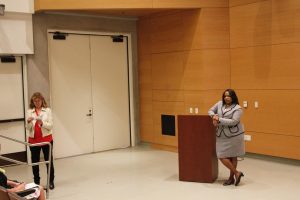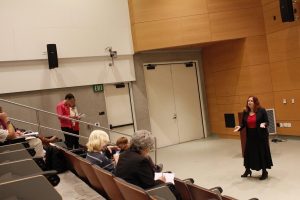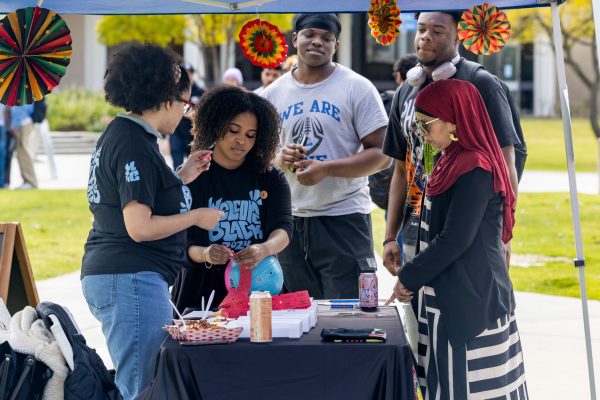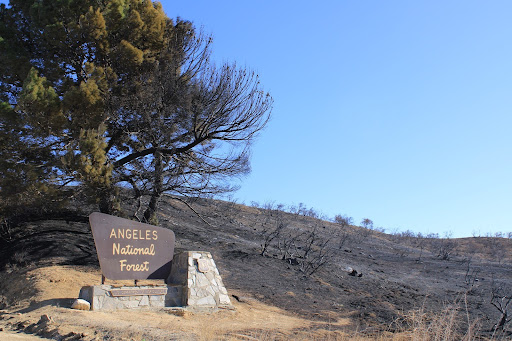Candidates discuss plans and ambitions for MC at public forum
Moorpark College is now one step closer to selecting a new president.
On Wednesday, the EATM auditorium housed a public forum that brought together the four remaining Moorpark College presidential candidates: Cliff Davis, Dr. Joyce Ester, Dr. Betty Inclan, and Dr. Vernon Smith. This forum allowed staff, students, faculty and administration alike to gather together and get to know these candidates.
“[This event] was great to know what was going on,” said Diana Rodriguez, 24, nursing major. “I hardly knew anything about the election before I came here today.”
Rodriguez was one of many students in attendance at this forum. Most of the students that attended were there either for a class assignment or because one of their professors recommended it to them.
The auditorium seats were also occupied by plenty of faculty and administration, which included Interim President Dr. Bernard Luskin and Vice President of Business Services Iris Ingram.
Ingram was one of the coordinators at the forum and could be seen welcoming guests outside of the auditorium, as well as ensuring that everybody received both a grading sheet for each candidate and an index card to write down their questions to submit.
She was assisted by Executive Vice President Lori Bennett and Academic Senate President Mary Rees, who were also coordinators at the forum.
Luskin dipped in and out of the auditorium during the forum’s four hour run-time–obviously adhering to his busy schedule–but that didn’t stop the entire room from erupting in applause every time Rees introduced him to the audience.
“We’re forever grateful for all that [Luskin] has done for us in this past year,” said Rees to the audience.
Jim Walker, Managing Partner at Community College Search Services (CCSS), was also in attendance to listen to these four candidates speak.
The CCSS is a team of executive search consultants that are dedicated to helping districts identify, recruit and hire top-level executives for a college or district. Walker has been an involved facilitator for the search committee throughout the process.
According to Walker, this forum was the last step before the final interviews for the position, which took place on March 27. There haven’t been any updates on the results of those private interviews, but the current time-frame for the final selection is expected to be mid-April.
Starting at 11a.m., Rees brought the first candidate to the front of the auditorium. Each candidate began with an opening speech, then answered a short list of pre-made questions, then a random selection of questions from the audience–although by the third candidate it became evident that they were using most of the same questions each time–and finally a closing statement. Unfortunately, video was not allowed–by request of the Chancellor.

Cliff Davis was the first candidate to speak. Upon entering, he proceeded with confidence to the front of the auditorium to begin his speech.
“This is really a fantastic institution,” said Davis at the beginning of his speech. “It’s one of the premier community colleges in the nation.”
Davis serves as Vice Chancellor for Advancement, Student Affairs, Workforce Development and Executive Director of the Foundation at Ozarks Technical Community College (OTC) in Springfield, Missouri. OTC is a 15,000 student multi-campus system with three campuses, two centers, and a robust online program.
Davis guides the long-term strategic vision of OTC. Through these strategic initiatives, OTC has become a leader in strengthening the diverse communities that it serves.
His background goes further than that, with a couple jobs as a presidential assistant at Missouri State in his extensive resume as well. Davis holds a Bachelor of Science and a Master of Arts in Communications from Missouri State and is nearing completion of a doctorate in instructional leadership and higher education administration (ABD) from Lindenwood University.
While reciting his background at OTC, Davis stated that it was named as one of the top community college programs by the Aspen Institute–an achievement that Moorpark College has also been awarded.
Davis was first asked what attracted him to Moorpark College, as well as the strengths and challenges that he will be tasked with if he takes office here.
Davis began his answer by commending Moorpark College’s impressive retention rates and described this college as a comprehensive and fantastic institution.
“I want to be on the winning team,” Davis said.
Davis also explained that Springfield is a college town, so his experience as a college facilitator has been extensive, and that he believes Moorpark College to be the place for him.
He stated that listening will be very important to him in his first days at Moorpark College. This is already a task that Davis is taking part in at Moorpark College, since later on he explained that a few days ago he had approached a student on campus and asked his opinion of the school. According to Davis, this had probably seemed odd to the student, since Davis was dressed in casual attire and a St. Louis Cardinals baseball cap.
He then expressed that his love for the Cardinals would be a challenge for him at Moorpark College.
The idea of growth led into the next topic of discussion, which began with the explanation that Moorpark College is currently in “growth mode,” which begs the question of how Davis would be able to handle that growth.

Davis answered this inquiry by explaining that his institution is also currently in “growth mode.”
“I’ve had a front row seat in dealing with growth for a long time,” said Davis.
The questions from the audience began with the topic of the non-profit foundation and Davis’ overall opinion of it. He answered by stating that he was a huge proponent of the foundation, and he believed that the president should remain the leader of it.
The questions then shifted focus to ask how Davis planned to reach out to students at Moorpark College.
“I want to go out and meet the students,” Davis explained. “I don’t believe in making students nervous by pulling them into my office. I’d like to be out on the campus and have an open-door policy,”
A later question called student success into focus, to which Davis responded with his belief that student success should become easier to achieve.
“I would like to be rid of graduation barriers,” said Davis. “All students should have to do is sign their name.”
The next and final question then asked: What is your leadership style?
“I’m surprised the question wasn’t ‘am I a micro-manager,'” said Davis. “I believe in a hands-off relationship, and instead I focus on hiring strong people. If I feel something isn’t at its best, then I will use hands-on methods.”
In his concluding statement, Davis stated that he was a first-generation college student in his family.
“I have a strong passion for community colleges,” said Davis. “Everyday I’m looking for the next OTC or Moorpark student.”
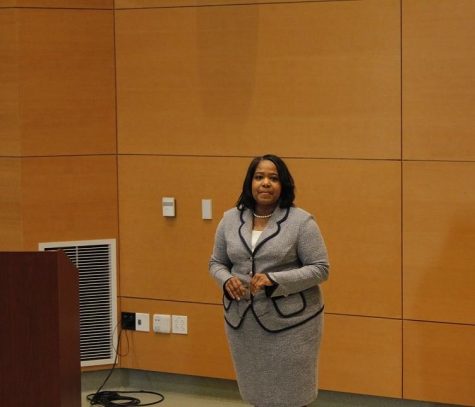
Joyce Ester was the next candidate to speak. Her confidence was matched well with her ability to hold a crowd with her voice. Early on, she acknowledged her apparent tendency to talk at lightning speed, but that did not at all lessen the impact of her voice.
Ester opened by explaining that education speaks to who she is as a person, since she holds a distinct interest in the life span and development of a person.
Recently, Ester served as President of Kennedy-King College in Chicago. During her tenure, the graduation rate grew as a result of increased focus on student progress, as well as faculty and staff development. Ester was instrumental in securing grants used to enhance academic and student support services.
Ester holds a Bachelor’s degree in Sociology from Northern Illinois University. She earned a Master’s degree in Developmental Studies and Doctor of Philosophy in Child and Adolescent Development from the University of California, Santa Barbara.
When asked what attracted her to Moorpark College, Ester commended the success of various programs on campus, as well as Moorpark’s commitment to transferring.
As a leader, Ester is very motivated to work at Moorpark College, but she doesn’t see it as a place that needs any help
“I’m not here to help Moorpark College, but rather work alongside the people of this great community,” said Ester.
Ester used a quote, from an Aboriginal woman named Lila Watson, that she believed was indicative of the role she wished to have at Moorpark College. The quote was, “If you have come to help me, you are wasting your time, but if you have come because your liberation is bound up with mine, then let us walk together.”
Ester was asked what she planned to accomplish in her first 100 days, as well as her first 1,000 days at Moorpark College.
“In my first 100 days, I’ll plan a major listening tour,” Ester explained. “I want to find out what everyone loves and what to do differently, and by my first 1,000 days I want to be able to say that we have improved.”
Ester then makes a point that she would express many times throughout the night, which is that she did not want to view the college from a top-down perspective. She explained that if she were to ask for opinions, she wouldn’t want to just focus on the leaders.
Ester was then asked her priorities in the community, which she responded to by explaining that she would want to always be visible in the community.
“It’s not my job to know everything,” Ester explained. “It’s my job to know everybody, because everybody knows everything.”
Ester gave an example of her involvement in the community at Kennedy-King by explaining that she used to provide a leader’s state of the college address.

An interesting idea that Ester brought up was a ‘lunch with the president’ event. This would have Ester select 10 students at random to sit down and have lunch with her, which she will use as an opportunity to listen to the students and learn about their thoughts and concerns regarding Moorpark College.
While working at Bakersfield College, Ester helped establish the first Veterans Resource Center on campus, so her enthusiasm was evident when she was asked about her involvement with student veterans.
“[Veteran services] is a big heart of mine,” Ester said. “We need to support them as they have supported us.”
At the conclusion, Ester once again expressed her belief that success is based upon collaboration from everyone, and that governance should remain entirely inclusive.
“I don’t want an us-them mentality, because it takes all of us,” Ester said. “I don’t believe in using a top-down system of governing, It’s important that we are engaged with the students.”
A 15-minute break proceeded Ester’s speech, which then ended with Betty Inclan entering the auditorium.

Inclan was all smiles when she took center stage in the auditorium. If one thing could be certain, it’s that she was ecstatic to be where she was at that moment.
Inclan’s career in education has enabled her to hold positions in California and Florida. Most recently, she served as an associate superintendent/vice president of academic affairs at Allan Hancock College for 14 years, and the president of Berkeley City College for over four years.
During her tenure as president of Berkeley City College, enrollment grew by 46 percent, and she expanded distance learning, contract education, and the international student program.
Inclan earned a Doctorate in Educational Administration from the University of Texas at Austin and is a graduate of the Community College Leadership Program at the University of Texas. She holds a Master’s degree in English from Kent State University and a Bachelor’s degree in English from the University of Miami.
At the beginning of her speech, Inclan explained what attracted her to Moorpark College.
“What impresses me most is the mission statement [for Moorpark College],” said Inclan. “Student success is a key aspect of college.”
She explained that another key aspect was that everyone involved worked closely with each other, since the people involved are the backbone of any institution.
“I believe in a philosophy of collaboration,” said Inclan.
Inclan then stressed the importance of ensuring that student success is achieved for any student that may be struggling to achieve their goals.
“What’s important is that we address the achievement gap,” Inclan explained. “We need to help students complete their goals as students.”
Inclan described Moorpark College as the intellectual center of the community. She explained that this college has to perform that role for the community, and we also need to work closely with the community.
“We have to put the ‘community’ in community college,” Inclan stated. “There has to be dialogue among the community.”
The question of what Inclan could bring to Moorpark College was then asked, in which she responded that she hoped to bring a culture of evidence and innovation.
Like the first two candidates, Inclan was asked about how she would spend her first 100 days at Moorpark College.
“My first one hundred days will be all about listening,” said Inclan. “I want to ask about the strengths of this college and have open access to Associated Students.”
Then, she was asked about her first 1,000 days.
“At a thousand days, I want to look at the new trends that have surfaced, as well the new opportunities,” said Inclan. “Community partnerships are also important at this time.”
An integral question that most of the candidates were asked was how they would handle the current growth of Moorpark College, since we are currently in ‘growth mode.’ Most of the candidates, including Inclan, stressed the importance of coordinated efforts and enrollment management.
“I want to restore sections, take a look at the demand, and look ahead,” Inclan said. “I will take a holistic approach to enrollment management, as well as a coordinated approach.”

Just like Ester before her, Inclan was asked about her planned involvement with student veterans on campus. She responded by expressing her support of a Veterans Resource Center, since she believes that it would provide the support that veterans need and deserve.
“Veterans need peer-to-peer help and support,” Inclan stated.
Inclan’s involvement with transfer at her previous college was then brought into question, to which she responded with an example of her tenure at Berkeley City College.
At Berkeley City College, Inclan worked closely with the Associated Students in order to bring them into the school’s administration. Her passion for participatory governance stretched far, which allowed her to have a more networked involvement with the students.
This coordination among students an administration stretched beyond her own campus and into the universities that students would eventually transfer into.
“I brought the university to the campus, for the convenience of the students,” Inclan stated.
Inclan concluded by explaining why she would make a good fit as president of Moorpark College.
“With the breadth of my experience, I believe that I can make a good fit,” Inclan said. “It appeals to me that we are going to excel together.”

Vernon Smith was the last candidate to speak at the forum. He entered the auditorium with evident poise and confidence, and made his way in front of the audience.
For the last two years, Dr. Smith served as Chief Academic Officer and Provost at MyCollege Foundation and Portmont College at Mount St. Mary’s, a “greenfield” start-up, non-profit college created at the Bill and Melinda Gates Foundation and successfully launched in January.
Dr. Smith started his education at Mesa Community College in Mesa, Arizona, and earned Bachelor of Arts degrees in Latin American Studies and Spanish at Brigham Young University graduating Magna Cum Laude.He has a Master of Organizational Behavior from the Marriott School of Management.He earned a Doctor of Philosophy in Organization and Administration of Higher Education from the Center for the Study of Higher Education at The University of Arizona.
“I am a product of community college,” said Smith. “It helped me see the vision of what I could be.”
An early question for Smith inquired about his effectiveness as a leader and how he would bring that leadership to Moorpark College. He explained that his strengths would incorporate perfectly with what Moorpark needs. He had just been through a period of growth, which is exactly what Moorpark College is going through right now.
“My number one strength is leadership,” said Smith. “I will count on a perspective and strategic vision to move things along.”
Smith specifically called for the need to have stable external funding sources, as well as the need to develop the people involved with the institution.
“What Moorpark doesn’t want to do is lose character with growth,” said Smith.
Along with all of this, Smith explained that helping students in need should always be a key aspect of college.
“I’m more focused on finding students in need,” Smith explained. “I’ve found a passion in developing a student risk management system.”
To top it all off, Smith explained that the management of growth needs to be a coordinated effort among everyone involved.
“It’s not about the idea that I have, but the one that we come up with together,” said Smith.
Falling back on the topic of students in need, an audience member asked Smith about the importance of programs like ACCESS for students. Smith explained that some students need that opportunity to move forward as students.
“Sometimes just a simple accommodation will help students in need,” Smith said.
Another audience member then asked Smith his opinion on non-profit foundations, as well as fundraising efforts.
“There is an art and science to raising money and there are people who want to help,” Smith said. “We need to find those people and collaborate with them.”
Smith is then asked about his planned involvement with students, and how he would reach out to them.
“I want to be accessible to all students,” said Smith. “I want to cheer them on at events and really get to know them.”
He also explained that faculty are a key aspect of the equation, and that students need a strong voice in the governance of the school.
Smith also answered admirably to a question regarding student veterans, to which he also called for the creation of a Veterans Resource Center.
The final question directed at Smith asked for a list of his favorite things about Moorpark College. He mentioned EATM as being one of the most impressive programs at the college, and that the integration between academic and student support was outstanding. He also admired Moorpark’s strength in transferring.
“I’m not one for building on weaknesses, but strengths,” said Smith.
Another aspect that Smith loves about Moorpark College is the people.
“When I come on this campus, I see smiles,” Smith said. “The people really make the difference.”

Along with his appreciation of the people at Moorpark College, Smith explained that it’s important to build people in order to increase the strength of the college.
“I believe in building people, and I’m committed to a community that does that,” said Smith.
In his conclusion, Smith thanked everyone who has given him this opportunity.
“I would be honored to serve as president,” Smith concluded.
Once Smith made his final statements, Rees concluded the event by thanking everyone that attended.
Even though the size of the audience fluctuated throughout the night, many people attending were very engaged by the speeches that they got a chance to hear. Students in particular were impressed by the candidates.
“They seemed genuinely passionate about the college,” said Ivan Hernandez, 19, nursing major. “The lunch with the president idea in particular seemed like a great way for students to express their unbiased opinions.
However, some students offered some concerns that weren’t brought up during the event.
“Personally, I’m interested in the revival of programs like the cafeteria,” said Hernandez.
Overall, students were appreciative of the opportunity that this open forum gave them.
“I like that [this event] lets students speak and have a say in the matter,” said Benny Balderrama, 21, engineering major. “Students may come and go, but they need a voice.”
The end of the semester is almost on the horizon, and with that comes a very important decision for Moorpark College. A new president not only brings a new face at the head of the table, but also a new outlook on the future of the college.
Each candidate has their own distinct vision for this school, and the direction that we will take in the future rests greatly on their leadership. All that’s left is for the district to make its choice.
For more information and future updates on this election, keep in touch with the Student Voice.

